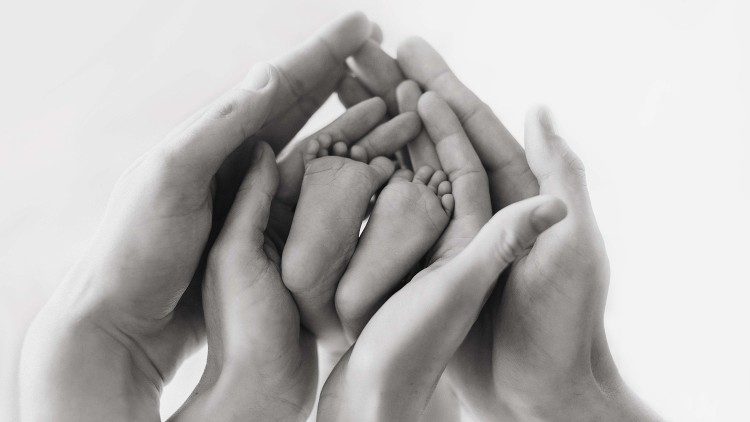Pope Francis has today addressed members of the Congregation for the Doctrine of the Faith, who are holding their Plenary Assembly. In his address, the Holy Father spoke about the “intangible value” of human life, of care for the terminally ill, and of the need to rewrite the “grammar” of responsibility and caring for those who are suffering.
Pope Francis on Thursday said that modern society “is progressively eroding the understanding of that which makes human life precious” by evaluating life in terms of efficiency and utility. He delivered the warning in an address to the Congregation for the Doctrine of the Faith, which is meeting in Plenary Assembly.
Speaking specifically to the issue of care for the terminally ill – the focus of the reflections of the Congregation – the Pope talked about the need to “convert the gaze of the heart” in the light of compassion, and praised the work of hospices where the “therapy of dignity” is practiced.
In his address, Pope Francis also encouraged members of the Congregation to continue “with firmness” their studies concerning the revision of the norms on “more serious crimes” (“graviora delicta”) in order to proceed along the path of transparency and of respect for the dignity of the “smallest” among us.
The intangible value of life
The Pope said that in contemporary culture, lives that are seen as no longer useful are considered “unworthy”, or to be “discarded”. In this situation, “devoid of authentic value,” there is danger of losing “the imperative duty of solidarity, and of human and Christian fraternity”. In fact, he continued, “a society deserves the qualification ‘civil’ if it develops antibodies against the culture of waste; if it recognizes the intangible value of human life; if solidarity is actively practiced and safeguarded as the foundation of coexistence”.
Christian doctrine, a dynamic reality
Thanking the Congregation for its service to the Church, Pope Francis emphasized that “the faith must take account of its intended recipient, so that it may be actively known and loved”.
“Christian doctrine is not a rigid system, closed in on itself; but neither is it an ideology that changes with the passing of years. It is a dynamic reality that, remaining faithful to its foundation, is renewed from generation to generation, and is summed up in a face, in a body, and in a name: Jesus Christ, the Risen One.”
The “grammar” of care
Pope Francis also reflected on the moment “when illness knocks on the door of our lives”. At those times, we need someone to take us by the hand, a “Good Samaritan”; we need “a human platform of relations” that can open us to hope; a balm to alleviate our “emotional distress” and “spiritual anguish”. The Pope insisted that we must never abandon “anyone in the presence of incurable illness”. Human life, he continued, “because of its eternal destiny, maintains all its value and all its dignity in whatever condition, even that of precariousness and weakness, and as such is always worthy of maximum consideration”.
“The theme of care of the ill, in the critical and terminal phases of life, highlights the Church’s duty to rewrite the ‘grammar’ of taking responsibility and caring for the care of suffering persons. The example of the Good Samaritan teaches us that it is necessary to convert the gaze of the heart – because many times those who look do not see. Why? Because compassion is lacking. Without compassion, those who look do not become involved in what they observe, and pass over it. On the contrary, those who have a compassionate heart are touched and become involved; they stop and attend to it.”
The ‘therapy of dignity’
Pope Francis quoted Mother Teresa of Calcutta, saying that anyone “who in the journey of life has lit even a single torch in someone’s dark hour has not lived in vain”. This describes “a style of closeness and of sharing… making dying more human”.
“In this regard, I think of how well hospices do palliative care, where the terminally are accompanied with qualified medical, psychological and spiritual support, so that, comforted by their loved ones, they can live the final phase of their earthly life with dignity. I hope that these centres will continue to be places where the “therapy of dignity” is practiced with commitment, thus nourishing love and respect for life.”
Rigour and transparency
The Holy Father also expressed his appreciation for the Congregation’s ongoing commitment to studying the norms for the so-called “graviora delicta”, the “more serious crimes” described in the motu proprio “Sacramentorum sanctitas tutela” of St John Paul II. Pope Francis placed their work in the context of updating the norms in order to make the procedures more effective in light of “new situations and issues” that have arisen in the current socio-cultural context”.
“I urge you to continue firmly in this task, in order to make a valid contribution in an area in which the Church is directly involved, to proceed with rigour and transparency in safeguarding the sanctity of the Sacraments and the human dignity violated, especially that of the little ones.”
ENDS
Source: Vatican News


